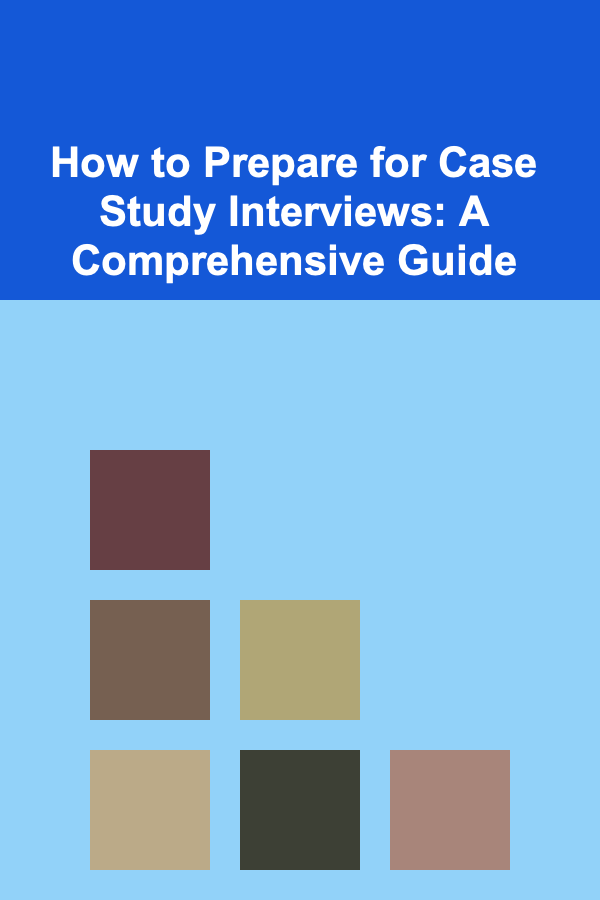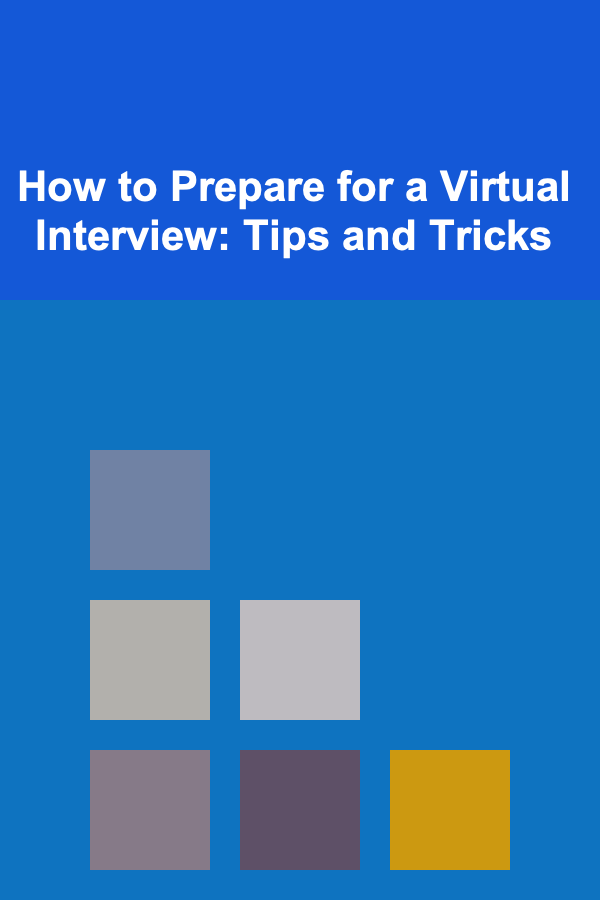
How to Prepare for Case Study Interviews: A Comprehensive Guide
ebook include PDF & Audio bundle (Micro Guide)
$12.99$7.99
Limited Time Offer! Order within the next:

Case study interviews are a common and often challenging component of the hiring process for a wide range of roles, particularly in consulting, finance, product management, and strategy. These interviews are designed to assess your analytical thinking, problem-solving skills, communication abilities, and overall business acumen. Unlike traditional behavioral interviews that focus on past experiences, case interviews present hypothetical business scenarios that you must analyze and provide recommendations for.
This comprehensive guide provides a detailed roadmap for preparing for case study interviews, covering key concepts, essential frameworks, practice strategies, and crucial tips for success. By understanding the nuances of the case interview process and dedicating time to focused preparation, you can significantly increase your chances of landing your dream job.
Understanding the Case Interview Landscape
Before diving into specific preparation techniques, it's important to understand the different types of case studies and the underlying skills that interviewers are looking for. This understanding will help you tailor your preparation efforts effectively.
Types of Case Studies
Case studies can be broadly categorized into several types, each requiring a slightly different approach:
- Market Sizing Cases: These cases focus on estimating the size of a particular market (e.g., "What is the annual revenue of the dog food industry in the US?"). They test your ability to make logical assumptions, perform quick calculations, and structure your thinking.
- Profitability Cases: These cases explore a company's declining profitability and require you to identify the root causes and suggest solutions. You'll likely need to analyze revenue, costs, and market dynamics.
- Market Entry Cases: These cases involve a company considering entering a new market. You'll need to evaluate market attractiveness, competitive landscape, and potential risks and rewards.
- Mergers & Acquisitions (M&A) Cases: These cases examine a company's decision to acquire another company. You'll need to assess the strategic rationale, potential synergies, and financial feasibility of the transaction.
- New Product Launch Cases: These cases involve a company launching a new product or service. You'll need to consider market demand, product positioning, pricing strategy, and marketing plan.
- Operational Improvement Cases: These cases focus on improving a company's operational efficiency, such as streamlining processes, reducing costs, or improving supply chain management.
Key Skills Assessed
Regardless of the specific type of case study, interviewers are evaluating you on several key dimensions:
- Analytical Thinking: Your ability to break down complex problems into smaller, manageable components, identify key drivers, and draw logical conclusions.
- Problem-Solving: Your ability to develop creative and effective solutions to the challenges presented in the case study.
- Communication Skills: Your ability to articulate your thought process clearly and concisely, both verbally and visually (e.g., with diagrams or frameworks).
- Business Acumen: Your understanding of fundamental business concepts, industry dynamics, and competitive strategies.
- Structuring: Your ability to organize your thoughts and present your analysis in a logical and coherent manner.
- Quantitative Skills: Your ability to perform basic mathematical calculations quickly and accurately.
- Creativity: Your ability to think outside the box and generate innovative solutions.
- Poise and Professionalism: Your ability to remain calm and confident under pressure, and to interact with the interviewer in a professional manner.
Mastering Essential Frameworks
Frameworks provide a structured approach to analyzing case studies and ensure that you don't miss any crucial aspects of the problem. While it's important to be familiar with common frameworks, remember that they are tools to guide your thinking, not rigid formulas to be applied blindly. Adapt and customize frameworks to fit the specific needs of each case.
Popular Frameworks
- Porter's Five Forces: This framework analyzes the competitive intensity of an industry by examining the bargaining power of suppliers and buyers, the threat of new entrants and substitutes, and the rivalry among existing competitors. It's useful for assessing the attractiveness of a market.
- SWOT Analysis: This framework assesses a company's internal strengths and weaknesses, as well as external opportunities and threats. It helps identify strategic options and potential areas for improvement.
- 4Ps of Marketing (Marketing Mix): This framework focuses on the key elements of a marketing strategy: Product, Price, Place (distribution), and Promotion. It's useful for developing a marketing plan for a new product or service.
- Cost-Benefit Analysis: This framework compares the costs and benefits of a particular decision or project. It's useful for evaluating the financial viability of an investment.
- Value Chain Analysis: This framework examines the activities that a company performs to create value for its customers. It helps identify areas where the company can improve efficiency or differentiation.
- MECE (Mutually Exclusive, Collectively Exhaustive): This is a guiding principle for structuring your analysis. "Mutually exclusive" means that each category or branch of your framework should be distinct and non-overlapping. "Collectively exhaustive" means that all possible options or considerations should be included.
- The 3Cs (Company, Customer, Competitor): This framework examines a company's internal capabilities, its target customers, and its competitive environment. It is a general framework useful for understanding a company's overall strategic position.
Using Frameworks Effectively
Here are some tips for using frameworks effectively in case study interviews:
- Understand the underlying logic: Don't just memorize the framework names. Make sure you understand the concepts and how they relate to each other.
- Adapt and customize: Don't be afraid to modify a framework to fit the specific needs of the case. Add or remove elements as necessary.
- Explain your reasoning: Clearly articulate why you're using a particular framework and how it will help you solve the problem.
- Don't force-fit: If a framework doesn't seem relevant to the case, don't try to force it. Choose a different approach.
- Prioritize ruthlessly: After brainstorming possible areas, prioritize based on available data or a hypothesis-driven approach. You can say, "Before diving into all aspects of X, I would like to briefly check Y to ensure that's not where the biggest issue lies, as that would be a quick fix."
Developing a Structured Approach to Case Solving
A structured approach is crucial for navigating complex case studies effectively. This section outlines a step-by-step methodology for tackling case interviews:
- Listen Carefully and Take Notes: Pay close attention to the interviewer's presentation of the case. Take detailed notes on key facts, figures, and constraints. Clarify any ambiguities by asking clarifying questions. Paraphrase the question back to the interviewer to ensure a shared understanding.
- Structure Your Approach: Before diving into the analysis, outline your approach to the interviewer. This demonstrates your structured thinking and allows them to provide feedback early on. "To solve this problem, I'd like to first understand [X], then analyze [Y], and finally recommend [Z]."
- Ask Clarifying Questions: Don't hesitate to ask questions to gather more information or clarify your understanding of the problem. Good questions demonstrate your critical thinking skills. Focus on questions that will help you narrow down the problem and guide your analysis. "Could you tell me more about [Specific aspect of the company/market]?," or "What are the key objectives of this [Merger/Launch/Investment]?"
- Develop a Hypothesis: Based on the initial information and your understanding of the problem, formulate a preliminary hypothesis. This will help you focus your analysis and test your assumptions. "My initial hypothesis is that the decline in profitability is due to increased competition in the market."
- Analyze the Data: Use the information provided in the case, along with your business knowledge and analytical skills, to test your hypothesis and identify the root causes of the problem. Perform calculations, create charts, and look for patterns and trends.
- Brainstorm Solutions: Once you have identified the key issues, brainstorm potential solutions. Consider a wide range of options and evaluate their feasibility, effectiveness, and potential impact.
- Prioritize and Recommend: Based on your analysis and brainstorming, prioritize the most promising solutions and develop a clear and concise recommendation. Support your recommendation with data and reasoning. "Based on my analysis, I recommend that the company focus on [Specific action] because it will [Positive outcome] and address the root cause of [Problem]."
- Consider Implementation: Go beyond simply recommending a solution. Briefly discuss the key steps involved in implementing your recommendation, as well as any potential challenges or risks. "To implement this recommendation, the company should first [Step 1], then [Step 2], and finally [Step 3]. One potential challenge is [Risk], which can be mitigated by [Mitigation strategy]."
- Summarize Your Findings: At the end of the case, summarize your key findings, recommendations, and the rationale behind your decisions. This reinforces your understanding of the problem and demonstrates your communication skills.
Developing Strong Communication Skills
Communication is just as important as analytical skills in case study interviews. You need to be able to clearly and concisely articulate your thought process, explain your reasoning, and present your recommendations in a persuasive manner. This involves more than just speaking clearly; it involves structuring your communication, using visuals effectively, and adapting to the interviewer's style.
Key Communication Strategies
- Be Structured: Start by outlining your approach and then follow a logical flow. Use signposting phrases like "First, I will..." or "Next, I will..." to guide the interviewer through your analysis. Regularly summarize your findings and recommendations.
- Think Out Loud: The interviewer wants to understand how you're thinking, not just the final answer. Verbalize your thought process, explain your assumptions, and describe the steps you're taking to solve the problem. Don't be afraid to say "I'm thinking out loud here..."
- Use Visual Aids: Use diagrams, charts, and frameworks to illustrate your analysis and recommendations. Visual aids can help you communicate complex information more effectively and make your presentation more engaging. Practice drawing these neatly and quickly.
- Listen Actively: Pay attention to the interviewer's cues and feedback. Adjust your approach based on their comments and questions. Show that you're engaged and responsive.
- Be Concise: Avoid rambling or getting bogged down in unnecessary details. Focus on the key points and communicate them in a clear and concise manner. Practice being direct and to the point.
- Be Confident (But Not Arrogant): Project confidence in your abilities, but avoid being arrogant or dismissive. Acknowledge the interviewer's expertise and be open to their feedback.
- Practice Active Listening: Repeating back the question or a key point helps ensure understanding and shows engagement. For example, "So, if I understand correctly, the main problem is..."
Mastering Mental Math and Data Interpretation
Many case study interviews involve quantitative analysis, so it's essential to be comfortable with mental math and data interpretation. Practice performing basic calculations quickly and accurately, and learn how to interpret charts, graphs, and tables.
Improving Your Quantitative Skills
- Practice Mental Math: Practice performing addition, subtraction, multiplication, and division in your head. Use online resources or apps to improve your mental math skills. Focus on common calculations that are relevant to business problems, such as percentage changes, compound growth rates, and present values.
- Master Excel Shortcuts: Familiarize yourself with common Excel shortcuts and functions. This will allow you to perform calculations more quickly and efficiently. While you won't typically use Excel in the interview itself, the practice will enhance your understanding and speed.
- Understand Data Presentation: Learn how to interpret different types of charts and graphs, such as bar charts, line graphs, pie charts, and scatter plots. Be able to identify trends, patterns, and outliers.
- Estimate and Approximate: In many cases, you won't have access to precise data. Learn how to make reasonable estimates and approximations. Be able to justify your assumptions.
- Unit Conversion: Be comfortable converting between different units (e.g., millions to billions, kilograms to pounds).
Tips for Working with Numbers in a Case
- State Your Assumptions: Whenever you make an assumption, clearly state it to the interviewer. This demonstrates your awareness of the limitations of the data and your willingness to be transparent.
- Show Your Work: Walk the interviewer through your calculations, even if they seem simple. This allows them to follow your thought process and identify any errors.
- Label Your Units: Always include units (e.g., dollars, percentages, years) in your calculations and answers. This helps avoid confusion and ensures that your results are meaningful.
- Check for Reasonableness: After you perform a calculation, check to see if the result makes sense. If the result seems unreasonable, double-check your work or your assumptions.
- Round Appropriately: Round your numbers to a reasonable level of precision. Avoid using too many decimal places, as this can make your calculations more complicated.
Practicing Effectively
Practice is the most important factor in preparing for case study interviews. The more cases you practice, the more comfortable you'll become with the process and the more confident you'll feel. Focus on quality over quantity. Each practice session should be a learning experience.
Finding Practice Partners
- Friends and Classmates: Practice with friends and classmates who are also preparing for case interviews. This is a great way to get feedback and learn from each other.
- Career Services: Your university's career services office may offer mock case interviews. Take advantage of these opportunities.
- Online Forums: Join online forums or communities where people are preparing for case interviews. You can find practice partners and share tips and strategies.
- Former Consultants: Reach out to former consultants who may be willing to conduct mock interviews. They can provide valuable insights and feedback.
Structuring Your Practice Sessions
- Simulate the Real Interview: Recreate the conditions of a real case interview as closely as possible. Find a quiet place where you won't be interrupted, and time yourself.
- Focus on Specific Skills: Identify areas where you need to improve and focus on practicing those skills. For example, if you struggle with market sizing cases, practice those specifically.
- Record Your Sessions: Record your practice sessions and review them afterwards. This will help you identify areas where you can improve your communication skills, structuring, and analysis.
- Get Feedback: Ask your practice partners for honest and constructive feedback. Focus on both your strengths and weaknesses.
- Analyze Your Mistakes: Don't just brush off your mistakes. Take the time to understand why you made them and how you can avoid them in the future.
- Vary the Industry and Case Type: Don't only practice with cases from a single industry or type. The greater the breadth of your experience, the better you'll handle the actual interview.
Resources for Practice Cases
- Case Interview Books: There are many excellent books on case interview preparation, such as "Case in Point" by Marc Cosentino and "Crack the Case System" by David Ohrvall.
- Consulting Firm Websites: Many consulting firms, such as McKinsey, Bain, and BCG, have sample cases on their websites.
- Online Case Banks: There are online case banks that offer a wide variety of practice cases.
- Business School Case Studies: Harvard Business School and other business schools publish case studies that can be used for practice.
- Industry Articles: Read widely in business publications (e.g., The Wall Street Journal, The Economist, Forbes) to develop a strong understanding of current events and industry trends. This broader business knowledge will assist you in structuring and providing real-world context to your case responses.
Tips for Success on Interview Day
The day of the interview can be nerve-wracking, but by following these tips, you can maximize your chances of success:
- Get a Good Night's Sleep: Make sure you get plenty of rest the night before the interview. Being well-rested will help you think clearly and perform your best.
- Dress Professionally: Dress in professional attire. This shows that you take the interview seriously and that you're respectful of the interviewer.
- Arrive Early: Arrive at the interview location early. This will give you time to relax and collect your thoughts.
- Be Prepared: Bring a pen and paper with you. You may also want to bring a copy of your resume.
- Be Enthusiastic: Show that you're excited about the opportunity and that you're genuinely interested in the company.
- Listen Carefully: Pay close attention to the interviewer's questions and instructions. Don't interrupt them.
- Think Before You Speak: Take a moment to gather your thoughts before answering a question. It's better to pause and think than to ramble.
- Be Confident: Project confidence in your abilities, but avoid being arrogant.
- Ask Questions: At the end of the interview, ask the interviewer thoughtful questions about the company and the role. This shows that you're engaged and interested.
- Send a Thank-You Note: After the interview, send a thank-you note to the interviewer. This is a polite gesture that shows your appreciation for their time.
Advanced Strategies for Exceptional Performance
Beyond the fundamentals, several advanced strategies can help you stand out from the competition and demonstrate exceptional problem-solving and communication skills.
Hypothesis-Driven Approach
A hypothesis-driven approach involves formulating a preliminary hypothesis early in the case and then using your analysis to test and refine it. This approach is more efficient than a purely exploratory approach and demonstrates your ability to focus on the most important aspects of the problem.
Example: Instead of saying, "I'm going to analyze all the company's costs and revenues," you could say, "My initial hypothesis is that the decline in profitability is due to increased marketing costs. I'll start by analyzing the company's marketing expenses and comparing them to previous years and industry benchmarks."
Quantitative Sensitivity Analysis
Sensitivity analysis involves examining how the results of your analysis change when you vary your assumptions or inputs. This demonstrates your understanding of the uncertainty involved in business decisions and your ability to assess the robustness of your recommendations.
Example: "My recommendation is based on an assumption that the company can achieve a 10% increase in sales. I've also considered a scenario where sales only increase by 5%, and in that case, the project would still be profitable, but the ROI would be lower."
Thinking Beyond the Obvious
Don't be afraid to think outside the box and suggest unconventional or innovative solutions. Demonstrate your creativity and your ability to challenge conventional wisdom.
Example: Instead of simply recommending that the company cut costs, you could suggest that they explore new revenue streams, such as launching a new product or entering a new market.
Demonstrating Intellectual Curiosity
Show genuine interest in the problem and a desire to learn more. Ask insightful questions and engage in a thoughtful discussion with the interviewer.
Example: "I'm curious about the company's competitive landscape. Are there any emerging competitors that the company should be aware of?"
Personalizing Your Approach
While frameworks are important, avoid applying them mechanically. Tailor your approach to the specific needs of the case and demonstrate your ability to think critically and adapt to new information.
Example: Instead of simply applying Porter's Five Forces, you could modify the framework to better reflect the specific dynamics of the industry being analyzed.
Conclusion
Preparing for case study interviews requires a significant investment of time and effort. However, by understanding the key concepts, mastering essential frameworks, practicing effectively, and developing strong communication skills, you can significantly increase your chances of success. Remember to be structured, analytical, creative, and confident. Good luck!

Building a Digital Library of E-books: A Comprehensive Actionable Guide
Read More
How to Keep Track of Expiration Dates on Office Supplies
Read More
How to Prepare for a Virtual Interview: Tips and Tricks
Read More
How to Start a Part-Time Typing Job and Earn Extra Income
Read More
How to Write a Winning Rental Property Advertisement
Read More
How to Understand Tokenomics in Blockchain Projects
Read MoreOther Products

Building a Digital Library of E-books: A Comprehensive Actionable Guide
Read More
How to Keep Track of Expiration Dates on Office Supplies
Read More
How to Prepare for a Virtual Interview: Tips and Tricks
Read More
How to Start a Part-Time Typing Job and Earn Extra Income
Read More
How to Write a Winning Rental Property Advertisement
Read More